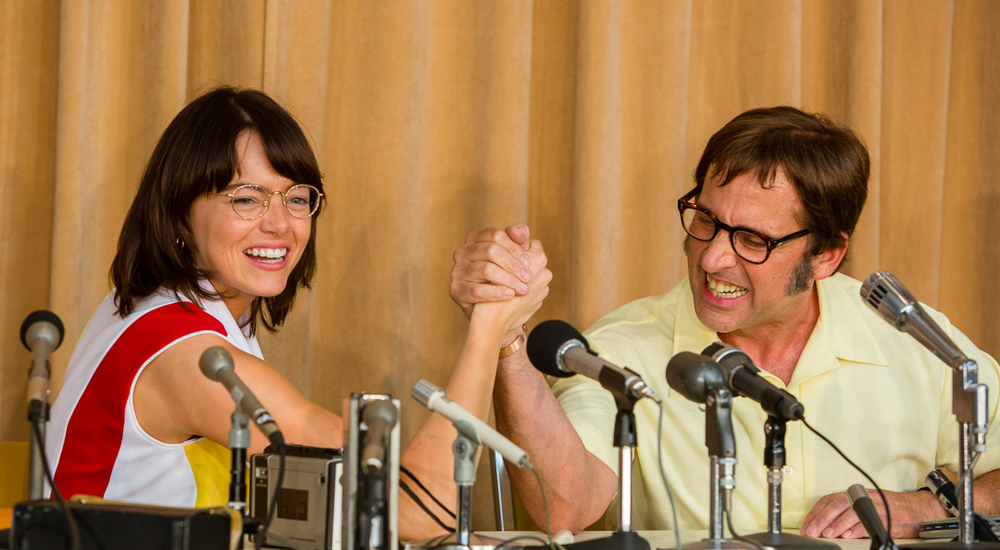“It’s not your fault. It’s just biology.”
In 1973 Billie Jean King and Bobby Riggs took to the court in a highly publicized tennis match that proved to be the turning point in the politics of their game. The match, one of the most watched televised sporting events of all time, was as interesting as the two members playing in it - a unique facet to the story that directors Jonathan Dayton and Valerie Faris successfully capture in their new film Battle of the Sexes.
While many already know the outcome of the match, Battle of the Sexes proves to be so much more than tennis. Given today’s political climate, the central message hidden within the sporting event is just as relevant today as it was back then - though no one fully knew the impact it would have on the world at large.
The film picks up in 1972. Billie Jean King (Emma Stone), the number one player in the world, is vocal about the unfair treatment women get when they step off the court. Their pay is pennies on the dollar compared to their male counterparts, their accommodations aren’t as nice and they aren’t listened to by promoter Jack Kramer. In an effort to change the situation King rounds up a few of the best players and starts her own league, signing them all to a one dollar contract.
On the other side of the net sits Bobby Riggs (Steve Carell), a former tennis champion who has settled into retirement by succumbing to his strong need to gamble…and gamble big. His late night ventures to the tennis court show that he still has some game left, even if his hustler mentality has taken over in regard to his regular income.
At first glance our two leads don’t appear to have much in common; however, that alienation isn’t long lived as we quickly begin to realize that both are experiencing emotional stress off the court. King, after getting her hair done by Marilyn, a pretty hair stylist, begins to question her attractions. Riggs, caught on the right side of a large bet, is struggling to connect with his wife after tennis leaves him board and yearning for something productive.
It is in these authentic moments that allows us to better understand both our players, connecting with them on a personal level as, outside the white lines, they appear rather ordinary. King’s vocal feminist fight against the tennis association brings about a lot of chatter, especially given her strained relationship and on-tour bedmate in the early 70s.
Stone handles the emotional rollercoaster with poise and grace. Always vulnerable, she presents a hard shell, effectively yearning to better understand herself while fighting for a larger cause. The internal struggle she displays is heightened by the curiosity of those around her - so many silent looks and harsh whispers generates a string of tense matches, almost thwarting King’s career well before the iconic match ever takes place.
Riggs, for what its worth, doesn’t require such a transformation. Witty and sarcastic, his power lies within his words as he shouts his misogynistic viewpoints from the rooftops, often using them to strike a chord with King and garner a laugh from those watching on. He’s there to entertain, cocky in his abilities as he constantly shows he will do just about anything to make a buck.
Sarah Silverman’s Gladys Heldman serves as the steady scene stealer. The women’s tour manager never walks into a room without a cigarette (the tour’s lone sponsor), spitting out sharp responses to anyone who dares challenge her opinion or ability. It is she who keeps King grounded during her journey of self discovery, even if she doesn’t completely realize her effect in the moment.
When the day of the match comes the film has little to offer. While most everyone knows the outcome, I applaud the editing that allows the story to maintain its swift pace. We don’t get hit with statistical analysis (though an argument about the color guard announcer the night before was unexpectedly memorable), point-for-point rhetoric, or nail biting slow motion antics - the match is played out and the winner named.
When it is all over you look back and appreciate how far we have come while fully realizing just how far left we have to travel. That being said, Battle of the Sexes a not a revolutionary film. When you have such strong subject matter, its hard not to award such a compliment. But with a high caliber performance from Stone and a solid counter from Carell, the film makes you think, which should be compliment enough.
*This review was originally featured as part of our 2017 Toronto International Film Festival coverage

